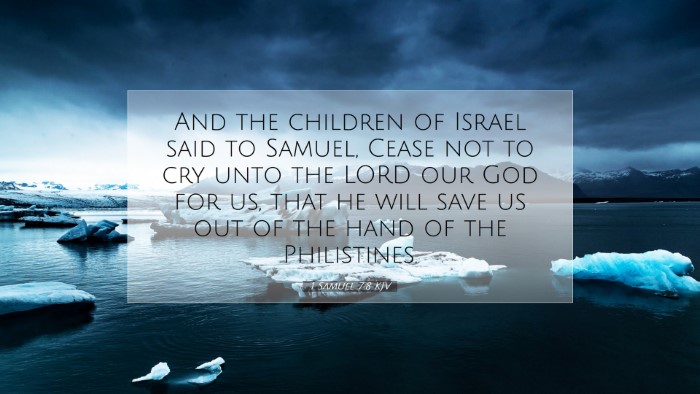Commentary on 1 Samuel 7:8
1 Samuel 7:8 states: "And the children of Israel said to Samuel, 'Do not cease to cry out to the LORD our God for us, that He may save us from the hand of the Philistines.'
Context and Background
The narrative in 1 Samuel 7 is pivotal in the history of Israel, marking a transition from chaos and oppression by the Philistines to a period of renewal and deliverance. The Israelites faced dire circumstances, dominated by their enemies, and they recognized their need for divine intervention.
According to Albert Barnes, the request of the Israelites to Samuel highlights their awareness of their need for God's aid. After years of neglecting their relationship with God, they turn back—reaffirming the crucial role of intercessors like Samuel in the life of the nation.
Insights from Matthew Henry
Matthew Henry emphasizes the significance of communal prayer during crises. The Israelites’ plea to Samuel is a corporate acknowledgment of their plight. They do not merely ask for help; they recognize their inability to save themselves and see the necessity of appealing to God through a mediator. This reflects a profound understanding of the role of prayer in seeking divine assistance.
- The Importance of Intercession: Samuel's intercessory role is critical. The act of crying out to the LORD is portrayed as not just a ritual but a desperate plea for mercy and salvation.
- Restoration of Relationship: Their request indicates a return to God after a period of apostasy, highlighting the themes of repentance and restoration.
Contributions from Adam Clarke
Adam Clarke expands on the emotional and spiritual aspects of this verse. He notes that the Israelites, faced with defeat and fear, exhibit a sense of humility by recognizing their dependence on God, which underscores a key theological principle: the necessity for divine help in times of trouble.
- Human Weakness: Clarke discusses the human condition, asserting that true strength lies in acknowledging one’s weakness before God.
- Leadership of Samuel: The mention of Samuel in this plea also emphasizes the significance of godly leadership in guiding people back to a covenant relationship with God.
- God’s Sovereignty: Their plea is rooted in the belief that God has the power to save, illustrating the theology of God's sovereignty over nations and circumstances.
Theological Implications
The plea for intercession points to several theological truths:
- The Role of Mediators: The text illustrates the biblical principle of mediation. Just as the Israelites relied on Samuel, Christians see Christ as the ultimate mediator between God and humanity.
- Corporate Faith and Responsibility: This verse demonstrates the need for corporate faith and responsibility. The Israelites came together to seek help, representing a united cry for divine rescue.
- Divine Compassion: The verse signifies God's compassionate nature. He responds to sincere pleas for help, emphasizing His readiness to save those who turn back to Him.
Application for Today
The themes present in 1 Samuel 7:8 hold significant relevance for modern believers:
- Emphasis on Prayer: Just as the Israelites sought Samuel's intercession, contemporary believers are reminded of the power of prayer and the importance of intercessors within the faith community.
- Recognition of Dependence on God: The need for divine intervention is timeless. Believers today must recognize their need for God's guidance and support in the face of overwhelming challenges.
- Community in Crisis: The request made by the children of Israel highlights the importance of community in spiritual distress—encouraging believers to support each other in prayer and action.
Conclusion
1 Samuel 7:8 serves as an evocative reminder of the enduring need for reliance on God in times of trouble. Through the insights of Matthew Henry, Albert Barnes, and Adam Clarke, we glean essential truths about intercession, humility, and the communal aspect of seeking divine help. In answering these calls for salvation, we affirm the continuity of faith throughout history and the ever-constant need for God’s grace in our lives.


